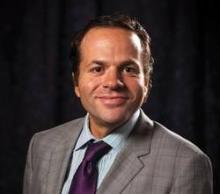LONDON – Cure rates of 93%-100% were achieved in patients with chronic hepatitis C virus genotype 1 treated with both simeprevir and sofosbuvir despite the presence of advanced cirrhosis in a phase IIa trial.
Sustained virologic responses with dual therapy for 12 weeks (SVR12) were 93% with and 93% without the additional use of ribavirin. SVR rates following 24 weeks of treatment were 93% for dual therapy with ribavirin and 100% with no ribavirin. The findings cast further doubt on the benefit of using ribavirin with newer antiviral agents.
"SVR12 rates were high, regardless of baseline characteristics," Dr. Eric Lawitz said when presenting these data from the COSMOS study at the International Liver Congress 2014.
Dr. Lawitz, of the Texas Liver Institute at the University of Texas Health Science Center in San Antonio, added that the baseline characteristics included prior treatment history, METAVIR score, and the presence of known resistance factors – the Q80K polymorphism or IL28B genotype.
Simeprevir (Olysio) and sofosbuvir (Solvadi) are once-daily formulations recently approved for the treatment of chronic hepatitis C virus (HCV) genotype 1 in several countries, including Canada and the United States.
The aim of the COSMOS study was to test the efficacy and safety of these two novel antiviral treatments in tandem in patients with chronic HCV genotype 1 infection who had not previously received any anti-HCV therapy or who had been treated with pegylated interferon plus ribavirin but had not adequately responded.
There were two cohorts of patients, Dr. Lawitz explained. The first cohort comprised 80 patients without cirrhosis (METAVIR F0-F2) who had not responded to prior treatment, while the second cohort included 87 patients with advanced cirrhosis (METAVIR F3-F4) who were either null responders or treatment naive. He presented data only on cohort 2.
Patients were randomized to receive 12 or 24 weeks of simeprevir plus sofosbuvir with or without additional ribavirin. The median age of the study population overall was 58 years, 67% was male, and 91% were white. Just less than half of randomized patients had cirrhosis, and 54% were null responders. Dr. Lawitz pointed out that genotype 1a was the most prevalent subtype of HCV, with around 40% having the Q80K polymorphism and 79% having the IL28B (non-CC) genotype.
Three patients randomized to the 24-week study arm discontinued treatment early. Reasons for discontinuation included one death unrelated to treatment, withdrawal of consent by one patient, and one adverse event unrelated to treatment (dual therapy–only arm).
"When we look at all 87 patients, the SVR12 was 82/87, with two [2.3%] patients failing for nonvirologic reasons, and three [3.4%] patients relapsing," Dr. Lawitz reported at the meeting, which was sponsored by the European Association for the Study of the Liver.
SVR12 rates were 98% and 95% in patients with METAVIR F3 and F4, respectively, and 96% and 94% in null responders and never-treated patients. SVR12 in patients with the IL28B genotype were 94%, 98%, and 95%, respectively, for the CC, CT, and TT forms.
Looking more closely at the three patients with viral relapse, no common factors were found that could help to predict the response to treatment.
On the whole, simeprevir plus sofosbuvir with or without ribavirin was generally well tolerated, Dr. Lawitz said. The most frequent adverse events were fatigue, headache, and nausea, occurring in 37.9%, 19.5%, and 17.2% of the overall study population, respectively.
"Numerically, to look at adverse events, they were more frequent in the ribavirin-containing arms compared to the ribavirin-free arms," he observed. And although bilirubin elevations were frequent, they were mostly mild and occurred primarily in the ribavirin-containing arms.
The study was sponsored by Janssen. Dr. Lawitz has received research support and speaker fees, and has acted as an advisory board member for Janssen, Gilead Sciences, and several other companies.


